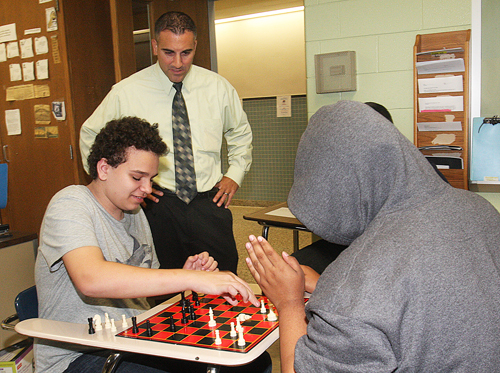Column: Making moves with the RHS Chess Club

Tension filled the area as the kings and queens of the battlefield took their positions.
One competitor stared into his opponent’s eyes, trying to pull a single thread of a thought from the depths of his mind before striking his next blow.
Then, without a word, a knight had fallen. A scheme for victory was dashed.
OK. Maybe that description is a little dramatic for a chess match. But literally, it’s on point.
At least, in the depths of my weird mind it is.
So at last week’s story meeting, when one of my colleagues pitched a story about the start-up of Riverhead High School’s chess club, I think I got more excited than anyone else in the room — including the woman whose idea it was.
I really enjoy chess — and, for that matter, any other competitive endeavor. But chess involves a particular strategy and mental aspect that few other outlets offer. There are no bad calls from a ref, no wind in your face, no injuries. The resources at your disposal are limited, each tool with a certain use designed to somehow defeat the person sitting across the table from you — and your opponent has the exact same inventory!
There are no excuses other than simply making a bad move.
When my colleague said she had a scheduling conflict and couldn’t interview chess club advisor Dave Spinella, I made my move and hopped on the story myself.
Mr. Spinella is known to many of his students as “Spin.” The current girls’ varsity basketball coach, he’s a former basketball captain at West Babylon High School, where he also served as president of the school chess club.
“It would be nice to break the stereotype. It’s not the nerd club. And it’s not all guys,” he said, pointing out some female athletes in the room. “Chess teaches patience, problem solving skills, thinking on the fly and concentration.”
Last spring, Spin started the chess club after noticing a steady stream of kids coming in who had played in chess clubs in the middle school and at Pulaski Street but would have no similar outlet at the high school level.
The club started up in earnest this fall with support from the Parent-Teacher-Student Organization, which purchased 10 chess boards and two clocks for the students.
About 20 students showed up last week at the first club meeting of the school year. They included some of Spin’s athletes, some freshmen who had played in the middle school chess club and some upperclassmen who had started playing last spring.
At one table, a pair of female basketball and volleyball players huddled over one chess board. Miecko Vail was teaching Joanna Messina, who was playing her first game of chess ever.
Miecko made a move that exposed her queen to Joanna, who was unaware how important that mistake could be to winning. Ever the competitor, I couldn’t help but point the error out to Joanna. Miecko took her move back, but Joanna didn’t seem to mind and the game went on.
Spin said he’d like to have Ron Boyd speak to the chess club. He’s a former educator at Pulaski Street School who, along with Wanda Nardolillo, built up that school’s chess club in the mid-1990s. Boyd retired in 2004.
Boyd says there’s more to chess than just winning the match. He said he ran Pulaski’s in-school suspension program and would use the game as a tool to teach kids about more than the game itself.
He pointed out that just by playing with someone else in a club setting, socialization skills are being nurtured. And even when you lose, he said, “you learn another strategy to apply to your own game.”
I guess I never thought of chess as a learning tool. But then again, when I think about the game of chess as an actual battlefield, I suppose that doesn’t exactly lend itself to teaching moments.
Maybe my next move is to learn a thing or two from Ron, Joanna and Miecko: Be a little less competitive and a little more social.
Which chess piece do I use for that?
Joseph Pinciaro is the managing editor of the Riverhead News-Review. He can be reached at 631-298-3200, ext. 238



